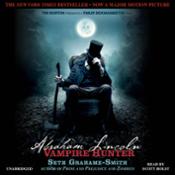Suddenly, Grahame-Smith was in demand, so he brought out an idea he'd had the year before. In 2008, author Seth Grahame-Smith noticed that all the books in the front of his local bookstore seemed to be either Abraham Lincoln biographies (the sixteenth president's 200th birth anniversary was approaching) or the Twilight saga

Like Pride and Prejudice and Zombies, the title of Abraham Lincoln: Vampire Hunter alone will sell the book — or at least encourage curiosity. But it's more than that: this book is also the story of its "author," who whiles away nearly a decade behind the counter of a small-town five-and-dime store, trying to write then abandoning novel after novel until the day a friendly regular leaves him a package wrapped in brown paper, containing letters and journals, on the condition that he write a book about them. The first line: "This is the journal of Abraham Lincoln."
The fellow obsesses for seven months over these documents, losing his family then nearly his mind as he pores over the secret diaries of our sixteenth president and his lifelong pursuit to rid America of the bloodsucking menace that had run unchecked since the founding of Jamestown in 1607, and eventually would become the deciding factor in the beginning of the Civil War. Mostly because one killed his mother.
The journals cover Lincoln's life from his frontier boyhood through his presidency and death, with Grahame-Smith inserting necessary historical details to fill in the gaps. Lincoln writes of the suspicious deaths of his aunt and uncle and then his mother, who was called "milk sick" until the truth came out. Lincoln learns from his father Thomas that vampires killed his own father and Abe's mother. Thomas owed a debt that could not be paid, and the vampire shylock took payment in another way.
At age 12, young Abe writes, "I hereby resolve to kill every vampire in America" and proclaims God as his enemy for allowing such things to happen. For a while he devotes himself to occult studies and physical improvement, such as developing his ax-wielding technique. Also pivotal is Lincoln's first encounter with slavery. He finds that "bargain" slaves (the weak, the old, etc.) are being bought in great numbers to be used as vampire food. Since no one cares what happens to a slave, there's not the trouble with the authorities that results when "real" people are sucked dry. In that way, the vampires were the first equalizers, realizing that blood is blood, whatever the skin color. Lincoln soon realizes that "So long as this country is cursed with slavery, so too will it be cursed with vampires."
Grahame-Smith takes a while to find his way with Abraham Lincoln: Vampire Hunter. At first, it seems to have been put together in much the same way as his Jane Austen zombie novel. In the beginning, the historical chronicle of Lincoln's life is readable and engaging, but the vampire aspects feel dropped in and not part of the whole, as if he wrote the history first and the fiction later.
So clumsily are some of these early portions added that I began to question whether perhaps the author had perhaps merely obtained an extant Lincoln biography (in the public domain or even unpublished) and added his own parts to it. (Before you scream "libel," just remember that even the best historians are sometimes accused of plagiarism. Controversy only sells more books.)
Later, as the main conceit takes precedence over the genuine history, this is much less of a problem. Abraham Lincoln: Vampire Hunter tells of Lincoln's political ambitions (and his vacillating nature toward them), and of his friendships with Edgar Allan Poe and his close and complex friendship with his mentor, the uncommon Henry Sturges. This relationship is one of the highlights of the book and shows Grahame-Smith's skill with masculine emotions.
Audiobook reader Scott Holst has difficulty overcoming the dry nature of the prose early on. But he shines in the "quoted" materials from the letters and journals, using a subtle country twang to embody Lincoln and his forebears with skill. The audiobook contains a conversation with the author; a bonus PDF document of historical photographs, paintings, and engravings; and a preview of Michael Koryta's novel So Cold the River.
The book's main success is also its greatest weakness, which is that it reads like a genuine history, but with vampires folded into the reality. Thus, I think it would appeal only to those readers who enjoy history and vampires: history buffs will likely balk at the liberties taken with the facts — a good deal of true stories from Lincoln's life are included, some of which are even more interesting than the slaughter of the undead — while horror fans will be disappointed in the long spans between kills.
Grahame-Smith makes at least one mistake for the sake of narrative immediacy, telling the last moments of a dying man from the perspective of omniscience, therefore reminding us we are reading fiction and breaking the spell momentarily. He also falls prey to the easy out, giving nearly every person who disagrees with Lincoln on any minor point connections with vampirism. It becomes so predictable, that when names like Jefferson Davis, Stephen Douglas, and John Wilkes Booth come up, you'll immediately guess "vampire" and nearly always be right.
But even with its flaws, Abraham Lincoln: Vampire Hunter
I know I'll never look at a five-dollar bill the same way again.






























1 comment:
I've been looking at the cover in the store and wondering whether I wanted to snag it. I just might.
Post a Comment